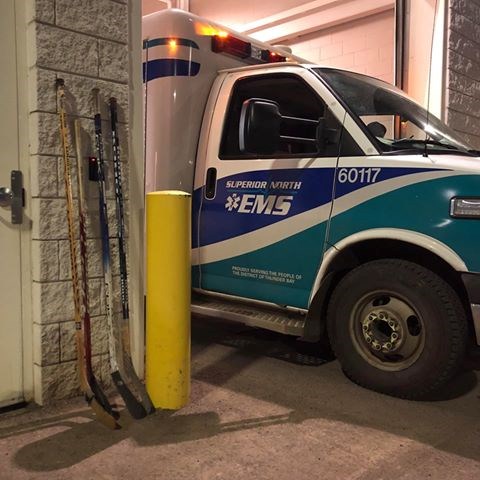THUNDER BAY — Thunder Bay paramedics say their workload, and delays in transferring patients to hospital, are leading to a growing number of Code Black periods.
That's an instance in which every available ambulance crew in the city is busy, and unavailable to take a call.
A Superior North EMS paramedic recently posted on his Facebook page that "it's not uncommon to have no ambulance available for hours. The city is fully aware of our broken ambulance system."
He placed the comment above a news story about a Quebec man who died, his family alleges, because an ambulance took too long to show up.
"This is a real possibility in the city of Thunder Bay," the paramedic wrote.
Superior North's Deputy Chief of Professional Standards agrees there's a problem.
"The situation is becoming more dire every day," Andrew Dillon said.
He attributes this to several factors.
"Compounding the offload delays (at the hospital), the hospital's issues in terms of where to put patients, the increasing call volumes,,,we're in Code Blacks more and more all the time."
Dillon said this is currently happening more than it has in the history of Superior North EMS.
Delays in releasing patients from the care of paramedics once the ambulance arrives at hospital are now as long as six or eight hours, he said.
The average wait for the hospital to take charge of the patient is an hour and a half.
"Eight hours of an offload delay is three-quarters of a shift...somebody sitting with a patient at the hospital, which means they can't be responding to other 911 calls," Dillon said.
He said people in dire need of a 911 response will still get that response, but less urgent calls are facing delays stretching into several hours.
"We triage, and work our way down the list. We get to you when we get to you."
A growing number of drug overdose cases, mental health issues and numerous paramedics being off work for COVID-19 precautions have recently exacerbated the pressure on ambulance crews, many of whom are working overtime.
Dillon said a new program under discussion with Thunder Bay Regional Health Sciences Centre may alleviate some of the stress on the system in the coming weeks.
"It's called Fit to Sit. What that does is it allows paramedics to triage, and bring in lower-acuity patients who have the ability to wait to see a doctor. It frees up our ambulances to get out to deal with more emergency calls."
The program is already in use in Sudbury.
Dillon reiterated a recent plea from Superior North EMS for people to refrain from using an ambulance as a fast track to a doctor unless it's really necessary.
"Even though you come by ambulance, it does not mean you are going to get priority at the hospital," he cautioned.
